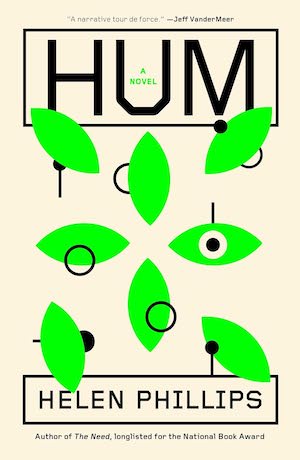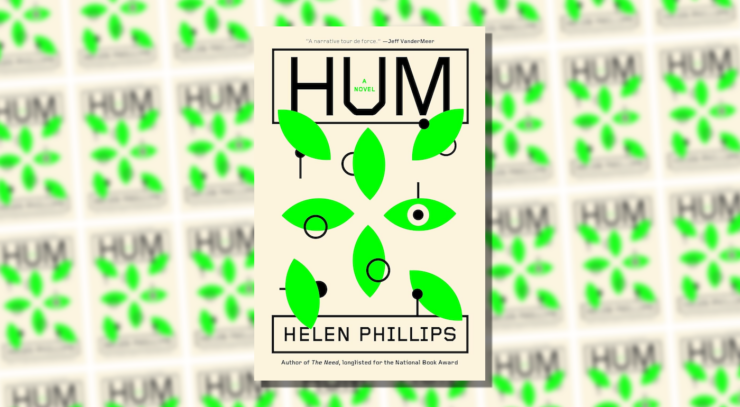Hello reader! Did you know that there is a book out there for people ground down by late-stage capitalism, to the point where they would consider changing their facial features in exchange for a year’s worth of rent? For mothers and wives who feel they are losing their families to the endless doomscroll? For people who need a little treat to get through increasingly dire days, but have trouble reining in their spending? For those who do not wish to be perceived, an impossibility in our heavily-surveilled world? Well, you’re in luck, because this book is published and available for you to read!
Do you approve this transaction?
Such is a standard interaction between human and hum (or anthropomorphized robot) in Helen Phillips’s latest genre-bending novel of the same name: No matter if bumping along on the subway or administering a dodgy surgery, the cheerily dogged robot is compelled to sell sell sell, until the besieged would-be consumer is worn down enough to just click yes and then immediately have buyer’s regret. But whereas both sides become increasingly exhausted by constantly selling things the other doesn’t really need, not to mention constantly having to decline being sold junk, Hum itself is not some useless bauble or creature comfort that will eventually end up in a landfill. Instead, it’s a quietly compelling cautionary tale on consumerism and the all-consuming need to find little pockets of peace in these continuously unprecedented times.
May Webb has lost her job to the robots, after training them to approximate human workers until they proved to be the better company investment. But unlike hums, humans still have to pay rent, so she undergoes a risky experimental surgery that will change her face just enough to throw off surveillance tech. (Experimental is the key word here; May only learns after the hum has adjusted various features that her new face is simply another way to aid artificial intelligence in eventually recognizing altered humans trying to trick the system.)
Playing lab rat pays handsomely enough to stave off the anxiety of finding a new job. On her way home to her husband and children, May can’t help but be tempted toward purchasing a family vacation to the city’s walled-off Botanical Garden, the rare (and very expensive) oasis in a metropolis so heavily polluted that even her young daughter Lu anxiously keeps track of the daily air quality index. Wishing for a break from their collective slog, not to mention an excuse to unplug from their respective devices, May impulsively buys a three-day stay that initially only serves to make husband Jem Clarke, Lu, and son Sy self-consciously aware of how they must treasure every minute inside the Garden, because every minute costs a fortune.
Buy the Book


Hum
Despite themselves, the Webb-Clarke clan is able to unplug—both physically and metaphorically—enough to appreciate their Edenic respite from their daily existence. Until, that is, a moment of inattention gets twisted into a nasty viral misunderstanding on social media that misrepresents their family, their vacation, and their values. May, who ironically has rendered herself impossible to be perceived by cameras, endures that same dearth of empathy or recognition, to the point where it jeopardizes her family’s security even more so than losing her income.
It’s a relatable plot line in a five-minutes-into-the-future setting, speculative in specific clever details that set up a rather contemporary conflict. No matter the backdrop, concrete jungle or secret garden, Phillips captures the minute details of existing in each particular moment; the same sensory focus is given to the freshly-cut grass scent in the Garden as to the gaslighting war footage blaring on the subway. Yes, the world is slowly ending around them, yet this story’s stakes are world-ending to the Webb-Clarkes only.
The worldbuilding is deliberately focused on a handful of supposed advancements that initially seem innocuous (or even positive) in name and function, yet each eventually reveals itself to be twisted in toxic and codependent ways. The etymology of “hum” supposedly stretches back to the centring chant of om, yet their presence is less meditative and more oppressive, like a low-level sound you know is wrong. May’s children consult bunnies affixed to their wrists so tightly that taking them off tears their delicate skin. Even when the entire family is at home together, each retreats into their respective woom, a supposedly nurturing space (whether it’s playing home videos or porn) that only serves to isolate them from one another. Phillips’ sparing use of these inventions highlights how chilling each of them, especially the wooms, are.
Hum occupies that tricky book space where it feels like it could have been a tighter novella, as opposed to a shorter novel (clocking in at about 270 pages). The extra length simply stretches the story past a tension point, and it ends with mostly welcome ambiguity that nonetheless could use a little more resolution.
Despite its title, the hums don’t overshadow the plot in the same manner of, say, I, Robot. Their presence is persistent yet deferential, until they decide that their participation is required, no human consent required. There is no Turing test to prove nor singularity to contend with, yet the anticipated betrayal by a hum is much more relatable to our present, with us blithely signing away our rights and data in order to access the latest app.
No surprise, there are no returns on human/hum interactions. Rarely is the product worth the cost; May is forced to immediately hold up the fresh memories of her vacation against the online ridicule she suffers for daring to indulge in a break. While Hum offers many facets of relatability to readers, mothers in particular will resonate with this can’t-win conundrum. Similarly, and crucially, the Webb-Clarkes are unable to return to the peace of their getaway, while also being changed from their pre-Garden selves.
Where Phillips’s spare writing works best is in holding back on key details, like how exactly the surgery transforms May’s face. Judging from her children’s reactions, as well as the ways in which her image is later reflected back to her, we can at least discern that she looks enough like herself, but that something is unmistakably off. May Webb, not the hum, has descended into the uncanny valley.
Hum is published by Marysue Rucci Books.










